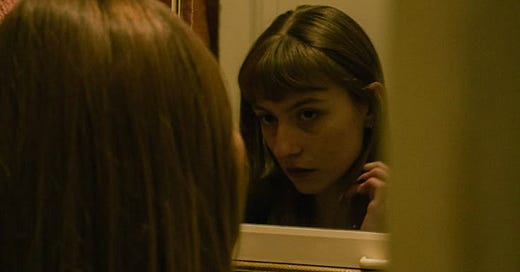As a kid, my aunt loved to throw parties. There was a party for every occasion, and often, no occasion at all.
She made us call her “cool aunt Lori”.
And there was a period where every other party was an “over-the-hill” party.
I can’t be the only one to remember those.
The decor was aways death-core: all black, head stones, “old as dirt” on everything, nursing home paraphernalia.
And I remember thinking, “This is correct and appropriate, this person IS really old. Just look at them.”
But now looking back, I realized…
These were 40th birthday parties.
FORTY.
Now, at 32, I cannot fathom thinking that 40 is old. To me, 40 is just barely not an infant anymore.
But if you do believe that 40 is old, then you’re correct. Because what ever you believe to be true, is. Reality is only constructed from the stories we hold and beliefs that come out of them.
Allow me to set the scene of one of my favorite studies of all time, conducted by Ellen Langer (who is still a total baller at 78 years old and a pioneer in mindfulness research) in the fall of 1981, now called colloquially known as the Counterclockwise Study:
Eight men in their 70s and 80s showed up to stay at a converted monastery for a day retreat in New Hampshire—a scientific geriatric sleep-away camp, if you will. They’re what you’d expect from your stereotypical 70/80-year-old (as Langer puts it, “this was a time when 80 was 80, not the new 60”)—feet shuffling, a little arthritic, some needing the assistance of a cane.
Before the men showed up, Langer and her team took various biomarkers often associated with age: dexterity, grip strength, flexibility, hearing, vision, memory and cognition. In these interactions with the men prior to the study, Langer also observed that many of them were accompanied by their adult children, who often answered questions on their behalf, coddling them in every conceivable way.
Upon arrival, Langer, noticing that she failed to bring any of her male assistants along and realizing that she wouldn’t have the capacity to shuttle the heavy suitcases of these men up to the house, told them that they would need to do it themselves—the study had begun, coddling time was over.
When they finally entered the home, they were transported. Every detail was set to just as it was in the 1950s, when the men were in their 40s or 50s. The music, television programs, magazines, decor—Nothing was modern. There weren’t even mirrors, only portraits of themselves from 30-odd years ago. Not only that, but during the course of the study, they were to act as though they were living in this period, discussing events of the time in the present tense. Even beyond that, they would be treated and spoken to as though they were in their 40s again.
At the end of the five days, their biomarkers were retested. On nearly every measure, the men saw outstanding improvements over the control group (who merely reminisced about the past, rather than embodying it). They had better dexterity, their posture improved, their bodies were more limber and nimble, and they even saw improvements in their eyesight. A game of touch football even broke out as the men were waiting to board the bus home.
These men, who arrived stiff and shuffling, now playing football.
And need I remind you, this is over five days.
It really makes you wonder—is how we age entirely up to biology? Or is it our beliefs about aging that run the show?
~~
This doesn’t end at age.
Langer also conducted a study that showed that when someone believes they sleep better/more than they really did (for example, they slept for 5 hours and were told they slept for 8), they perceived themselves to be better rested and had better reaction times. Conversely, those who slept more but were told they had slept less perceived themselves to be less rested and had slower reaction times.
And another study where participants drank the same milkshake: One labeled as “Indulgent: 620 calories”, the other as “Sensible: 140 calories”. Even though both were 300 calories, the “indulgent” label caused a steeper drop in ghrelin (the hunger hormone), signaling greater satiety.
And ANOTHER study where housekeepers were told their job was "good exercise" and met physical activity recommendations. Four weeks later, without changing any other behavior, they had reduced weight, lower blood pressure, and smaller waist-to-hip ratios.
I could go on, but I think you see my point:
We all have biases and beliefs that we take at face value as “reality”. We think reality objective. But reality is entirely subjective. The biases and beliefs inherited by family, culture, and experience. What life on Earth means and feels like to me is entirely different to what it means and feels like to you, and to every person you pass on the street.
The question is: What do you believe to be true about yourself and the world around you? What do you want to be true about yourself and the world around you? Because these beliefs will inform your actions, and thereby inform how your entire life unfolds.
Albert Einstein is famously quoted as saying:
“The most important decision we make is whether we believe we live in a friendly or hostile universe.”
The keyword here is decision. Because we are all experiencing the same things: physics, biology, chemistry—they’re all acting on us in the same, objective way. But it’s the meaning we assign to them that makes the difference. It’s why someone could look at a piece of art and feel nothing, while another person could be brought to their knees. It’s why some people look at an event and see despair, while someone else looks at it and sees hope. It’s why some people think their life is over at 40, and some people think it’s just beginning.
And, yes, which person we are is determined by the things that have happened to us and the things we have inherited, but we can decide to flip the script, change the way we see things, and change our reality and any moment. Yes, it takes some time and effort to rewire those deep neural ruts and grooves, but it can be done.
There’s a quote from West World that rattles around in my head more than I care to admit: “Have you ever questioned the nature of your reality?”

But I mean…do you? Do you question your thoughts? Your biases? Your assumptions? Do you ever wonder where they came from? If they’re really yours?
Do you ever question who wrote the rules? This is the way things are… Says who?
My personal life motto is: the rules are made up and the points don’t matter. Which, yes, is the tagline of Who’s Line is it Anyway, but I think it applies here.
And as Ellen Langer says: “The more different you are from the person who wrote the rule, the more important it is for you not to follow the rule”.
If a teacher tells you you can’t sing, draw, or write, then you will attach these labels to yourself and go your whole life believing that these are not things you should attempt or pursue. Even though that opinion is based on judgments and projections that have almost nothing to do with you, following the rules of a game you were never meant to play.
Noticing your thoughts and beliefs and questioning their origins is the most important and impactful tool for beginning to change your reality. Noticing the things we say about ourselves and others (we really are all just projecting, aren’t we)—what beliefs are holding you back? Making you miserable? What identity are you clinging to that no longer serves you? What rules do you confine yourself to that don’t make sense? You have to notice it to break free from it.
“I am” are dangerous words. Anything that follows has the immense power to constrict and confine your world and your life.
So, who do you believe you are?
want to support my work but don’t want to commit to yet another subscription?
Enjoy this piece? You might like these as well:
are you even listening?
I feel like I don’t have to educate this audience about how April is the real January. The real time for renewal and rebirth. Everything in nature is waking up—including my soul. But it’s not like Sleeping Beauty, gently stirring from a deep, restful slumber, eyelashes fluttering open like butterfly wings, awakening feeling light, renewed, and effortles…







Oh, I love this so much! Once I started questioning my beliefs, it was horrifying to realise how often I took my negative self-talk as fact. The biggest one for me was, “I’m not good enough.” Good enough for what? Who gets to decide that? It’s so hard to change our internal narratives but liberating once we begin to question them. Thanks for sharing this brilliant piece!